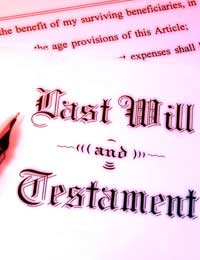The Importance of a Will

It is no big surprise that no one wants to make a will – the vast majority of us in fact! Making a will inevitably involves thinking abut the prospect of your own death, and, moreover thinking of leaving behind all of those that you love. For some the prospect is harder still if they feel they don’t have much to leave behind. However, a little time spent writing a will now could make all the difference when you have passed, saving upset to those who survive you.
Aside from making it clear where you want your money to go you may also wish to make it clear who you wish to act as your personal representative, acting on your behalf to assure that your estate is divided according to your wishes and, further, that the tax man does not take too much (after all, hadn’t you seen enough of him when you were alive?!).
Those who are not married to their partner or involved in a civil partnership with them may be especially keen to write a will as there estate will not automatically pass to their partner otherwise. Others keen to write a will include those who wish to exclude elements that might not be up to dealing with significant amounts of money sensibly.
Without a Will
Without a will the spouse of the deceased will automatically inherit everything if the estate is worth more than £125’000. If it is worth more the children will inherit anything in excess of £125’000 split equally between them. If there are no children alive then the share will pass to grandchildren. If there are no grandchildren the share will pass to surviving parents and after that to siblings
If there is no surviving spouse or civil partner the priority of inheritance stands legally in this order: children; parents; siblings or to the siblings children if the siblings had died in the lifetime of the deceased; half brothers and sisters; grandparents; aunts and uncles; half aunts and uncles. Finally if none of the above exist the estate will pass to the Crown.
If under these rules someone (such as a partner that has not married you or entered into a Civil Partnership with you) does not receive what they believe to be a reasonable share of the deceased’s Estate they can appeal under the Inheritance (Provision for Family and Dependants) Act 1975. Such claims are lengthy and tedious, making it all the more important that you make a will.
Clearly, in light of the above, you may wish to make a will if you have any intention of choosing sensibly who receives what.
Your Will and Inheritance Tax
Essentially a will is important with regard to inheritance tax as, firstly, you can avoid paying any tax at all if you stipulate that everything in your Estate is left to your spouse, and secondly, you can choose who deals with your final tax affairs after you have passed away.


Re: Will Inheritance Affect My Council Tenancy?
Im facing similar situation. Inheritence only enough to buy foreign property, agricultural holding, or derelict…
Re: Inheriting Property
Am I allow to get housing benefit on my mums property till its sold?even though I will eventually be entitled to 25%of the sale
Re: Inheriting Property
Am I allow to get housing benefit on my mums property till its sold?even though I will eventually be entitled to 25%of the sae
Re: Will Inheritance Affect My Council Tenancy?
I am living in temporary council accommodation and due to illness am receiving PIP plus Universal Credit. I am…
Re: Will Inheritance Affect My Council Tenancy?
I’m a council tenant my died and left a flat over 55 to live in that buliding to me how’s do I go ambition…
Re: Will Inheritance Affect My Council Tenancy?
I doubt this will be answered as I can’t see any answers to anyone else’s comments but here goes My mum wants…
Re: Will Inheritance Affect My Council Tenancy?
I have inherited property from my mother in law, as we live in council property could we rent the inherited…
Re: Will Inheritance Affect My Council Tenancy?
Assured social housing tenant (SH), lone parent recently deceased leaving an estate including a 3 bedroom…
Re: Will Inheritance Affect My Council Tenancy?
My disabled son lives in a council flat and receives benefits, including PIP. How could I arrange for him to…
Re: Will Inheritance Affect My Council Tenancy?
me and my brother are set to inherit 2 propertys but we have council flats. will we loose our rights to council…